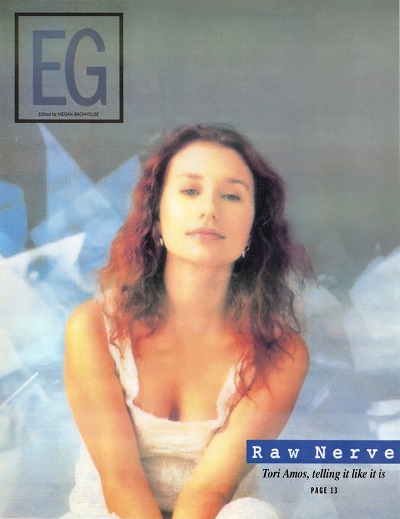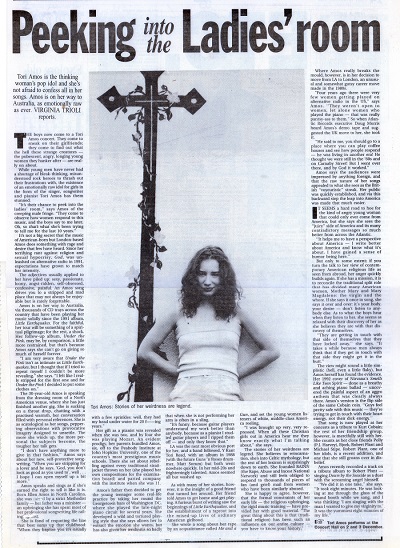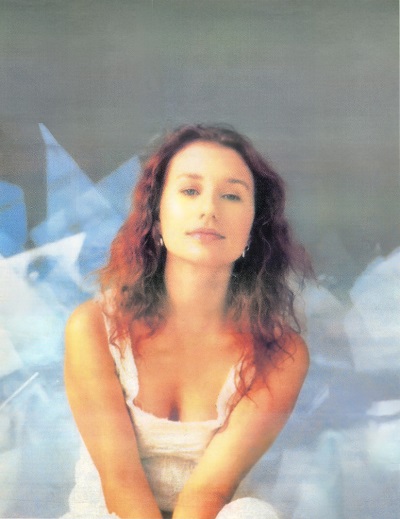|

songs | interviews | photos | tours | boots | press releases | timeline
EG (Australia)
November 18, 1994

Peeking into the Ladies' room
Tori Amos is the thinking woman's pop idol and she's not afraid to confess all in her songs. Amos is on her way to Australia, as emotionally raw as ever. VIRGINIA TRIOLI reports.
The boys now come to a Tori Amos concert. They come to sneak on their girlfriends; they come to find out what the hell these strange creatures -- the pubescent, angry, longing young women they hanker after -- are really on about.
While young men have never had a shortage of bleak-thinking, misunderstood rock heroes to thrash out their frustrations with, the existence of an emotionally raw idol for girls in the form of the singer, songwriter and pianist Tori Amos has them stunned.
"It's their chance to peek into the ladies' room," says Amos of the creeping male fringe. "They come to observe how women respond to this music, and the boys say to me later, Oh, so that's what she's been trying to tell me for the last 10 years."
It's not a big secret that the music of American-born but London-based Amos does something with rage and desire that few have heard. Since her terrifying rant against religion and sexual hypocrisy, "God," was unleashed on alternative radio in 1991 [sic], expectations have grown to match her intensity.
The adjectives usually applied to her have piled up: sexy, passionate, loony, angst-ridden, self-obsessed, confessive, painful. An Amos song drives you to a stripped and mad place that may not always be enjoyable but is rarely forgettable.
Amos is on her way to Australia, via thousands of CD trays across the country that have been playing her music solidly since the 1991 album, Little Earthquakes. For the faithful, her tour will be something of a spiritual pilgrimage; for the rest, a shock. Her follow=up album, Under the Pink, may be, by comparison, a little more restrained, but that's because Amos says she can't go on giving so much of herself forever.
"I am very aware that Under the Pink isn't as intimate as Little Earthquakes, but I thought that if I tried to repeat myself I couldn't be more revealing," she says. "I felt like I really stripped for the first one and for Under the Pink I decided to put some clothes on."
The 30-year-old Amos is speaking from the dressing room of a North American venue, where she has just finished another gig. She is sucking on a throat drop, chatting with a practised warmth, her conversation filled with personal references. She is as scatological as her songs, peppering observations with provocative imagery designed to unsettle. The more she winds up, the more personal the subjects become, the tougher her talk gets.
"I don't have anything more to give in that fashion," Amos says about her new, self-protective songwriting. "When you are stripping for a lover and he says, 'God, you don't look as good as you used to,' well . . . I hope I can open myself up a bit more."
Amos speaks and sings as if she's earned the right to tell it like it is. Born Ellen Amos in North Carolina, she was raised by a strict Methodist family -- her father was a minister -- an upbringing she has spend most of her professional songwriting life railing against.
She is fond of requoting the line that best sums up that childhood: "When they baptise you it's usually with a few sprinkles: well, they had my head under water for 20 fucking years."
Her gift as a pianist was revealed when she was two, and by four she was playing Mozart. An evident prodigy, her parents bundled Amos, six, off to the Peabody Institute at Johns Hopkins University, one of the country's most prestigious music schools. There she set about rebelling against every traditional straitjacket thrown on her (she played her own compositions for the examination board) and parted company with the institute when she was 11.
Amos's father then decided to get the young teenager some real-life practice by taking her round the Georgetown bars of Washington DC, where she played the late-night piano circuit for several years. She developed a wild and tortured playing style that she says allows her to extract the emotion she wants, but has also given her tendinitis so badly that when she is not performing her arm is often in a sling.
"It's funny, because guitar players understand my work better than anybody, because as a pianist I studied guitar players and I ripped them off -- and only they know that."
LA was the next most obvious port for her, and a band followed, Y Kant Tori Read, with an album in 1988 (with the future Guns 'n Roses drummer, Matt Sorum) but both went nowhere quickly. In her mid-20s and frighteningly talented, Amos seemed all but washed up.
As with many of her stories, however, it is the insight of a good friend that turned her around. Her friend told Amos to get home and get playing. A furious burst of writing saw the beginnings of Little Earthquakes, and the establishment of a taproot into the mixed-up lives of ordinary American girlhood.
She wrote a song about her rape by an acquaintance called "Me and a Gun," and set the young women listeners of white, middle-class America reeling.
"I was brought up very, very repressed. When all these Christian girls out in America hear me they know exactly what I'm talking about," she says.
The stories of her weirdness are legend. She believes in reincarnation, she's into Celtic mythology, but the rest of her lexicon is surprisingly down to earth. She founded RAINN (the Rape, Abuse and Incest National Network) and still feels obliged to respond to thousands of pieces of fan (and grief) mail from women who have been similarly abused.
She is happy to agree, however, that the formal constraints of her early life -- the religious upbringing, the rigid music training -- have provided her with good material. "The great thing about this is that (traditional religion) has been such an influence on our entire culture -- you have to know your history."
Where Amos really breaks the mould, however, is in her decision to move from LA to London, an unusual and somewhat gutsy career move made in the 1980s.
"Four years ago there were very few women getting played on alternative radio in the US," says Amos. "They weren't open to women, let alone women who played the piano -- that was really pantsy-ass to them." So when Atlantic Records executive Doug Morris heard Amos's demo tape and suggested the UK move to her, she took it.
"He said to me, you should go to a place where you can play coffee houses and see how people respond -- he was living in another era! He thought we were still in the '60s and on Carnaby Street! But I went over there, and by God it worked."
Amos says the audiences were impressed by anything foreign, and that the raw nature of her songs appealed to what she sees as the British "voyeuristic" streak. Her public was quickly established, and via this backward step the leap into America was made that much easier.
IT SEEMS a hard road to hoe for the kind of angry young woman that could only ever come from America, but she says she sees the "juicy" side of America and its many contradictory messages so much better from across the Atlantic.
"It helps me to have a perspective about America -- I write better about America and know what it's about. I have gained a sense of humor being here."
But only to some extent; if you turn the talk to her view of contemporary American religious life as seen from abroad, her anger quickly builds again. If she has a mission, it is to reconcile the traditional split role that has divided many American women, Mother Mary and Mary Magdalene: the virgin and the whore. If she says it once in song, she says is over and over: it's your body, your desire -- don't listen to anybody else. As to what the boys hear when they listen to her, she seems as relaxed with their discovery of her as she believes they are with that discovery of themselves.
"They are getting in touch with that side of themselves that they have locked away," she says. "It takes a while because men always think that if they get in touch with that side they might get it in the butt."
The view might sound a little simplistic (hell, even a little flaky), but Amos herself has found the evidence. Her 1992 cover of Nirvana's "Smells Like Teen Spirit" -- done as a breathy and aching piano ballad -- uncovered the painful aspect of an aggro anthem that was clearly always there. Amos's version is the flip side of the same Cobain coin. "Guys feel pretty safe with this music -- they're trying to get in touch with their heart energy, not their dick energy."
That song is not played at her concerts as a tribute to Kurt Cobain; the rest of her friendship group, however, is mercifully still with her. She counts as her close friends Polly (P.J. Harvey), Bjork, Robert Plant and Michael Stipe. Robert Plant, one of her idols, is a recent addition, and one that she still groans over in disbelief.
Amos recently recorded a track on a tribute album to Robert Plant -- singing "Down by the Seaside" as a duet with the screaming angel himself.
"We did it it one take," she says. "It took eight minutes. He was looking at me through the glass of the sound booth while we sang, and I was thinking: 'I am singing with the man I wanted to give my virginity to.' It was the yummiest eight minutes of my life."
Tori Amos performs at the Concert Hall on 2 and 3 December.
original article


[scans by Coral Schnippert and Sakre Heinze]
[transcribed by jason/yessaid]
t o r i p h o r i a
tori amos digital archive
yessaid.com
|